NICOSIA // Mehmet Ali Talat, the pro-settlement Turkish Cypriot leader, warned that Cyprus reunification talks will collapse if, as polls suggest, he loses to a nationalist hardliner in today's presidential elections. The vote is a defining moment for the divided island. It also has major ramifications for Turkey, which has little hope of joining the European Union so long as Cyprus, represented internationally by the Greek Cypriots, remains divided.
There are just 164,000 eligible voters in the tiny, self-declared Turkish Cypriot state, recognised only by Ankara. But Cyprus is a key part of a geo-strategic jigsaw, and the United States and Britain are watching the vote closely: both want Turkey anchored firmly to the West. Diplomats fear that if Mr Talat is ousted another opportunity to resolve the Cyprus problem might not arise for several more years.
Mr Talat, who has Ankara's tacit support, is confident of victory, although polls indicate he will be defeated by Dervis Eroglu, possibly in the first round. If so, "the [peace] talks will end after some time", Mr Talat, 58, said. Mr Eroglu, the Turkish Cypriot prime minister, advocates a two-state solution. His secessionist stance is vehemently rejected by the Greek Cypriots and contravenes the UN's three-decade-old push for a federal settlement.
"Mr Eroglu does not have a vision for a solution," Mr Talat said in an interview on his campaign bus last Tuesday, which toured villages where well-wishers presented him with trays of goat's cheese and home-baked bread. In 19 months of UN-facilitated talks, Mr Talat and Demetris Christofias, the Greek Cypriot president, have negotiated on the basis of reuniting the former British colony under a bizonal, bicommunal, federal system.
The two leftists are longtime trade union friends and pledged to reach a comprehensive settlement. Diplomats view their efforts as the best chance in decades for a solution. Greece and Turkey have also committed themselves to help resolving the frozen conflict. Cyprus was split along ethnic and religious lines by a Turkish invasion in 1974, triggered by a brief, Greek-inspired coup. Turkey still has 30,000 troops stationed in the north of the island.
Mr Christofias and Mr Talat recently issued an upbeat report on their talks. They made "good progress" on governance and power-sharing, European matters and the economy, Mr Talat said. Yet to be tackled are the sensitive matters of security, territorial adjustments and how to reconcile the property grievances of tens of thousands of internally displaced people. Mr Talat's challenge has been to persuade a jaded and disillusioned electorate that he is in reach of clinching a Cyprus settlement within a year or so.
Mr Eroglu, 72, has accused Mr Talat of making too many concessions, although he insisted that if he wins, he will continue settlement talks. Mr Eroglu could hardly walk away from the peace table. Ankara, which wants the peace process to continue, bankrolls northern Cyprus. "With Mr Eroglu you would have a spoiler back at the negotiating table," said Hubert Faustmann, a political analyst at the University of Nicosia.
"The talks would in all likelihood become a mere exercise for the sake of negotiations instead of a substantial attempt to solve the Cyprus problem." Mr Christofias is ready to negotiate with whoever is elected but insisted he will not resume talks from scratch. Analysts differ on the amount of sway Turkey has over its north Cyprus dependency. Some have said Mr Eroglu would be like a provincial politician with less power than the mayor of a small Turkish city.
"The relationship between Ankara and the Turkish Cypriots has changed in a way that Turkey respects more than it did in the past the autonomy of the Turkish Cypriots," Mr Faustmann said. Mr Talat's electoral vulnerability dates back to the last peace effort in 2004, which ended acrimoniously when Greek Cypriots rejected a UN settlement plan they deemed pro-Turkish. The less prosperous Turkish Cypriots endorsed the UN blueprint in a separate referendum.
A week later, Cyprus, represented by the Greek Cypriots, entered the EU, with the Turkish Cypriots effectively left out in the cold. Mr Talat had championed the 2004 plan and held out the prospect that, in the event of failure, its endorsement by his community would be rewarded by the EU. Turkish Cypriots hoped for direct trade with the bloc and direct flights, but the EU did not deliver, with Turkish Cypriots blaming Greek Cypriot obstructionism.
"Turkish Cypriots feel that their 'yes' vote [in 2004] has not been sufficiently reciprocated, so they are holding to account their leaders who steered them in that direction," said Erol Kaymak, a Turkish Cypriot political analyst. Mr Talat rejects criticism that he is responsible for failing to deliver. It was not his fault, he has said, that Greek Cypriots rebuffed the last peace plan. "Mr Eroglu represents ? those days and months and years of isolation and humiliation for the Turkish Cypriots."
If neither man emerges today with more than 50 per cent of the vote, a second round will be held on April 25 between the two front-runners. Five other minor candidates also feature on the ballot. Hugh Pope, the Turkey-Cyprus director of the International Crisis Group, said: "The talks have brought the two sides on Cyprus much closer than most people realise. If Talat leaves at this point, it's really hard to imagine how any future kind of talks are going to get off the ground."
mtheodoulou@thenational.ae






